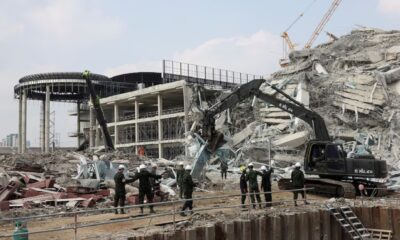Climate Change
Pakistani prime minister promises compensation to flood victims
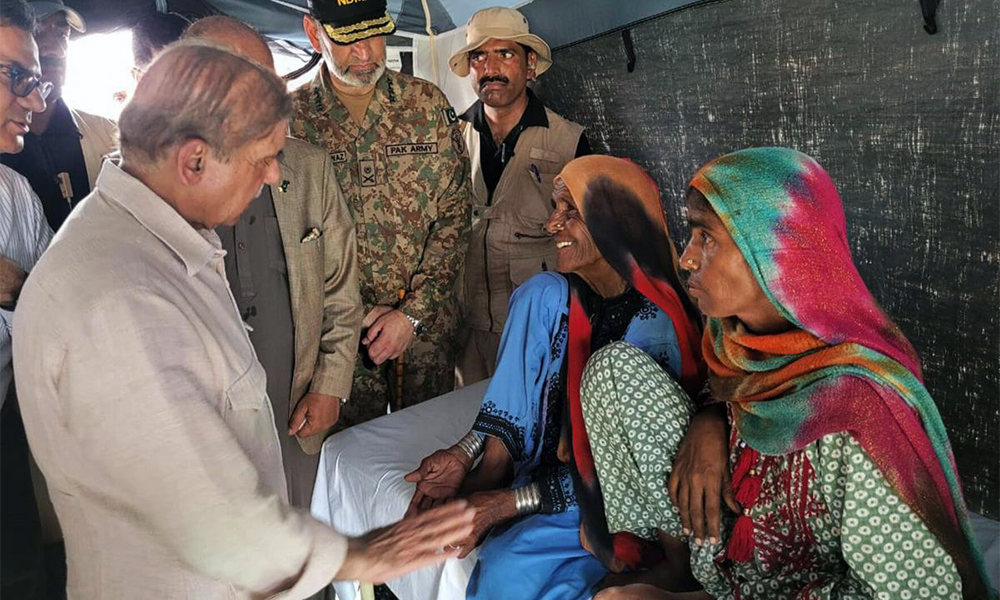
Pakistan’s prime minister on Wednesday promised the country’s homeless people that the government will ensure they are paid to rebuild and return to their lives after the country’s worst-ever floods, AP reported.
With winter just weeks away, half a million people are living in camps after being displaced by the flood, which destroyed 1.7 million homes.
So far, the government’s priority has been to deliver food, tents and cash to the victims. The floods have killed 1,481 people since mid-June and affected 33 million.
“We will do our best to financially help you so that you can rebuild homes” and return to a normal life, prime minister Shahbaz Sharif told several families living in tents and makeshift homes in the town of Suhbatpur in Baluchistan.
“Those who lost homes and crops will get compensation from the government,” he said in his televised comments.
Sharif also told dozens of school children, who were studying in a tent with help from the UN children’s agency Unicef in the town of Suhbatpur, that they will get a new school in the next two months.
“Pakistan never witnessed such huge climate-induced devastation,” Sharif told a gathering of lawyers in Islamabad on Wednesday. “It was painful to see inundated villages, towns and cities.”
Sharif said the winter season will start in Pakistan after 15 days, and “then another challenge for the flood victims will be how to survive in the harsh cold” as currently they were living in tents in summer, AP reported.
Even providing clean drinking water to flood-affected people has become a challenge, he said.
The floods have destroyed 70% of wheat, cotton and other crops in Pakistan. Initially, Pakistan estimated that the floods caused $10 billion in damages, but now the government says the economic toll is far greater. The United Nations has urged the international community, especially those responsible for climate change, to send more help to Pakistan.
The monsoon rains have swept away entire villages, bridges and roads, leaving hundreds of thousands homeless. At one point, a third of the country’s territory was inundated with water.
Multiple experts have blamed climate change for unprecedented rain-related damages in Pakistan.
Also Wednesday, Pakistan’s minister for climate change, Sherry Rehman, told a gathering of lawmakers from the Asia Pacific in the capital, Islamabad that right now the entire world is facing a threat from climate change which, she said, “knows no border”.
She called for reducing emissions to save other countries from the damage that her country is facing now.
Meanwhile, the first planeload of aid from Saudi Arabia arrived in Pakistan overnight.
So far, UN agencies and various countries, including the United States, have sent about 90 planeloads of aid.
On Wednesday, Julien Harneis, UN resident coordinator in Pakistan, told a news conference that member states had committed $150 million in response to an emergency appeal for $160 million.Pakistani prime minister promises compensation to flood victims
Pakistan’s prime minister on Wednesday promised the country’s homeless people that the government will ensure they are paid to rebuild and return to their lives after the country’s worst-ever floods, AP reported.
With winter just weeks away, half a million people are living in camps after being displaced by the flood, which destroyed 1.7 million homes.
So far, the government’s priority has been to deliver food, tents and cash to the victims. The floods have killed 1,481 people since mid-June and affected 33 million.
“We will do our best to financially help you so that you can rebuild homes” and return to a normal life, prime minister Shahbaz Sharif told several families living in tents and makeshift homes in the town of Suhbatpur in Baluchistan.
“Those who lost homes and crops will get compensation from the government,” he said in his televised comments.
Sharif also told dozens of school children, who were studying in a tent with help from the UN children’s agency Unicef in the town of Suhbatpur, that they will get a new school in the next two months.
“Pakistan never witnessed such huge climate-induced devastation,” Sharif told a gathering of lawyers in Islamabad on Wednesday. “It was painful to see inundated villages, towns and cities.”
Sharif said the winter season will start in Pakistan after 15 days, and “then another challenge for the flood victims will be how to survive in the harsh cold” as currently they were living in tents in summer, AP reported.
Even providing clean drinking water to flood-affected people has become a challenge, he said.
The floods have destroyed 70% of wheat, cotton and other crops in Pakistan. Initially, Pakistan estimated that the floods caused $10 billion in damages, but now the government says the economic toll is far greater. The United Nations has urged the international community, especially those responsible for climate change, to send more help to Pakistan.
The monsoon rains have swept away entire villages, bridges and roads, leaving hundreds of thousands homeless. At one point, a third of the country’s territory was inundated with water.
Multiple experts have blamed climate change for unprecedented rain-related damages in Pakistan.
Also Wednesday, Pakistan’s minister for climate change, Sherry Rehman, told a gathering of lawmakers from the Asia Pacific in the capital, Islamabad that right now the entire world is facing a threat from climate change which, she said, “knows no border”.
She called for reducing emissions to save other countries from the damage that her country is facing now.
Meanwhile, the first planeload of aid from Saudi Arabia arrived in Pakistan overnight.
So far, UN agencies and various countries, including the United States, have sent about 90 planeloads of aid.
On Wednesday, Julien Harneis, UN resident coordinator in Pakistan, told a news conference that member states had committed $150 million in response to an emergency appeal for $160 million.
Climate Change
UN and ICRC warn of serious water shortage in Afghanistan
The International Committee of the Red Cross in Afghanistan reported that an estimated 33 million people in the country face severe water shortage
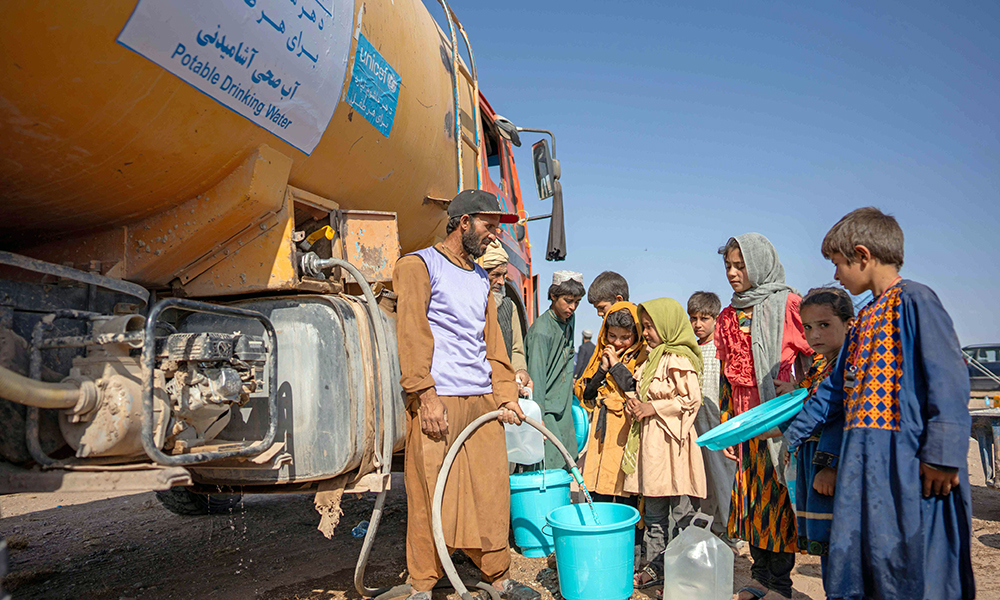
The United Nations Human Settlements Programme (UN Habitat) warned this week that 21 million people in Afghanistan are currently facing a serious water crisis and that the country needs major investments in water infrastructure.
Stephanie Loose, the head of the programme, said in a report that major Afghan cities such as Kabul, Kandahar and Herat are also facing a serious shortage of clean drinking water and that groundwater resources in these cities are decreasing significantly.
However, last week, the International Committee of the Red Cross (ICRC) in Afghanistan reported that an estimated 33 million people in the country face severe water shortage.
Marking World Water Day on March 22, the ICRC quoted a Kabul resident Shafiqullah Hamkar of District 5 in Kabul city as saying: “Our borewells have completely dried up because of the minimal snowfall and rainfall over the last few years.
“The sharp decline in groundwater levels has left us no choice but to rely on commercial water tankers for our most basic needs. It is a big challenge for us in the city,” he said.
ICRC said Hamkar represents an estimated 80% of Afghans who are dealing with the severe impact of erratic rainfall patterns, rising temperatures and droughts.
The situation is even worse in rural areas where people often rely on untreated surface water, which leads to the spread of waterborne diseases such as cholera and diarrhea.
“For millions of Afghans, who are already struggling with many challenges and facing a dire humanitarian situation, vital activities such as getting water to drink or cook and providing irrigation for crops are often impossible. This has a devastating impact on people’s health and access to food, and hampers the country’s potential for economic development,” says Martin De Boer, the head of programs for the International Committee of the Red Cross (ICRC) in Afghanistan.
He added that the lack of required infrastructure – including water-supply systems, dams and irrigation networks – further exacerbates the challenges. Responding to the needs of the people, the ICRC plays an important role in supporting communities and assisting authorities to improve and manage water supplies.
Climate Change
Over 500,000 Afghans displaced due to climate disasters in 2024: IOM

More than half a million people in Afghanistan were displaced due to climate disasters in 2024, the International Organization for Migration said in a country report published on Tuesday.
“Nearly 9 million individuals were impacted by climate hazards in the last 12 months, with over 500,000 displaced by floods, drought, and other disasters,” IOM said, AFP reported.
“Roughly three in five of those displaced relocated elsewhere within their province of origin”, with the western Herat and Farah provinces among the hardest hit, it said.
This week, 39 people were killed due to floods, hail and storms in southwestern Afghanistan, mainly in Farah, according to local authorities.
Afghanistan is among the poorest countries in the world after decades of war and is ranked the sixth most vulnerable to climate change, which is spurring extreme weather.
Drought, floods, land degradation and declining agricultural productivity are key threats, according to the United Nations.
Flash floods last May killed hundreds and swamped swaths of agricultural land in Afghanistan, where 80 percent of people depend on farming to survive.
“Over 11 million people in Afghanistan are at high risk of severe impacts from climate-induced disasters in the future,” the IOM said.
The UN agency estimates that “climate-sensitive livelihoods, like subsistence farming, make up 73 percent of jobs in Afghanistan”.
It added that “92 percent of villages have limited access to emergency services” and “96 percent lack resources for crucial measures like early warning systems and search and rescue.”
Climate Change
Floods in Farah and Kandahar claim the lives of 29 people

Officials from the disaster management departments of Farah and Kandahar report that floods in these two provinces have resulted in 29 fatalities and nine injuries.
Mohammad Israel Sayar, the head of disaster management in Farah, confirmed to Ariana News that 21 people lost their lives and six others were injured due to floods on Tuesday in the Qala-e-Kah district of the province.
According to Sayar, the victims had gone to the mountains of Qala-e-Kah for recreation purposes when floodwaters suddenly swept them away.
Officials from the disaster management department in Kandahar also stated that floods in the province have caused 11 deaths and injuries.
They reported that in the seventh district of the province, one woman and three children died when the roof of a house collapsed.
They added that in the fifth security district of the province, three women and one child lost their lives due to the floods. Two children and one man were also injured.
-

 Sport5 days ago
Sport5 days agoACB names Afghanistan A squad for tri-nation series
-
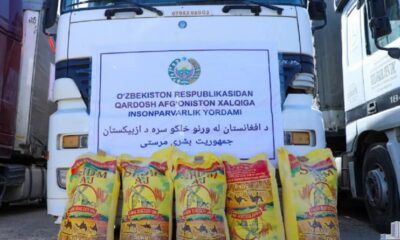
 Latest News5 days ago
Latest News5 days agoUzbekistan sends essential food aid to Afghanistan
-

 International Sports4 days ago
International Sports4 days agoIPL 2025: Last over drama; Ashutosh Sharma clinches win for Delhi Capitals
-
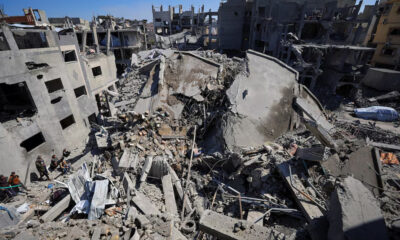
 Regional4 days ago
Regional4 days agoEgypt makes new proposal to restore Gaza truce as Israeli strikes kill 65
-

 Sport4 days ago
Sport4 days agoAfghanistan eliminated from Asian Beach Soccer Championship
-
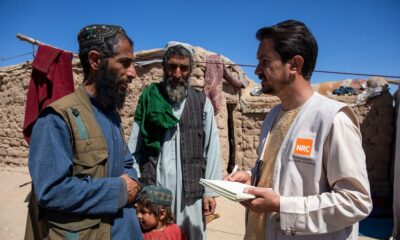
 Latest News4 days ago
Latest News4 days agoNorwegian Refugee Council cuts back on essential humanitarian services in Afghanistan
-
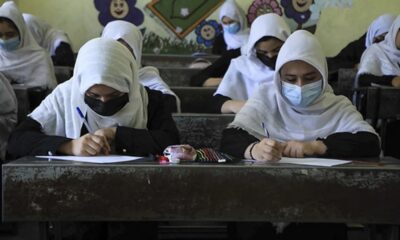
 Latest News4 days ago
Latest News4 days agoUN warns over 4 million Afghan girls will be deprived of education by 2030 if ban continues
-

 World3 days ago
World3 days agoSecretive Chinese network tries to lure fired US federal workers, research shows










